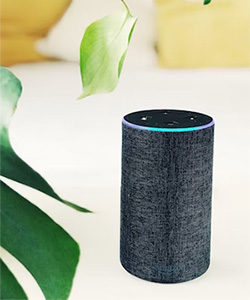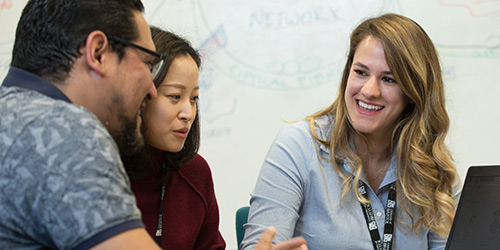“Alexa – how does research from Bristol help you work?”
Research initiated at Bristol is powering the rapidly expanding market in voice processing for devices such as smart speakers.
When a team of researchers from the Faculty of Engineering first started looking at new ways to develop the architecture of processors in the early 2000s, few people would have predicted that the results would become fundamental to the performance of smart speakers in millions of homes around the world. The work led to the formation of XMOS Ltd, a University of Bristol spin out that has sold over 10 million processors that now appear in famous voice-enabled technologies such as Alexa from Amazon.
Innovating processor cores
The original research at Bristol involved innovations in the architecture of processor cores for use in processor arrays on chips and in modules and systems along with the associated programming concepts. In particular, it explored processors with deterministic performance, multi-threaded processors, interprocessor interconnect and energy-efficient event-driven processing.
Professor David May, who led the research, subsequently filed fifteen patents on core technology which uniquely combines multi-threading for energy efficiency and performance while also delivering predictability and deterministic execution. This new combination has made XMOS’s xCORE architecture a perfect fit for real-time applications such as audio over ethernet and more recently voice recognition, all at new levels of energy efficiency and cost competitiveness.
From lab to worldwide adoption
 Further developments since Professor May created the XMOS spin-out in 2005 include the addition of superior Digital Signal Processing (DSP) capabilities that provide the computational power for designing far-field microphones – ideal for devices like voice-activated cooker hoods or TV remote controls that need to pick out voice from a lot of surrounding noise.
Further developments since Professor May created the XMOS spin-out in 2005 include the addition of superior Digital Signal Processing (DSP) capabilities that provide the computational power for designing far-field microphones – ideal for devices like voice-activated cooker hoods or TV remote controls that need to pick out voice from a lot of surrounding noise.
Building on these advances, XMOS has also gone on to produce several generations of its xCORE technology that have been qualified by Amazon for Alexa-enabled devices and are helping manufacturers to speed up the development of voice-enabled products. Customers include Tymphany, Sharp, Meridian and also Pillo Health, which is using voice technology based on xCORE within its 24/7 healthcare robot.
Recently XMOS has also launched xCORE.ai – a fresh breakthrough that will open up even more new opportunities and help realise the full potential of smart homes, smart healthcare, smart cities, industry 4.0, autonomous vehicles and other major technology markets that are helping to transform the way we live and work.
 Work with us
Work with us
Our Industrial Liaison Office helps you to develop research partnerships.
Quick facts
- University spin out makes breakthrough in voice recognition
- Manufacturers use products to speed up product development
- Over 10m processors sold worldwide
